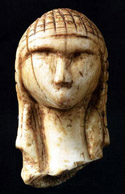Anthropology, Department of

Department of Anthropology: Faculty Publications
Document Type
Article
Date of this Version
2002
Citation
FROM: Endangered Peoples of Africa and the Middle East : Struggles to Survive and Thrive. Edited by Robert K. Hitchcock and Alan J. Osborn (Westport, Conn. : Greenwood Press, 2002).
Abstract
The Ogoni are a minority ethnic people who live in the Western Niger Delta Region of southern Nigeria. During the 1970s, Ogoniland, or the Ogoni Nation, became part of the Rivers State of Nigeria. There are approximately 500,000 Ogoni who represent less than 0.05 percent of Nigeria's 100 to 120 million people. The population density of this region equals 1,233 people per square mile, making it one of the most densely populated areas of Nigeria. Reliable information about the origin of the Ogoni is limited. Archaeological and oral historical evidence suggests that the Ogoni have inhabited the area for over 500 years. Presently, two theories exist about the origin of this people. First, the Ogoni may have migrated into their present territory from across the Imo River sometime around the eighteenth or the nineteenth century. Vestiges of this migration are two Ogoni villages, Warife and Utetuk, that still exist at the other side of the river. Warife still speak Khana, whereas Utetuk have adopted the customs and language of Annang, a neighboring tribe in the Akwa Ibom State. When they arrived in the region, the Ogoni did not find this area to be occupied. As a consequence, they were able to keep their identity from their neighbors-the Ibibios in the southeast, the Igbos to the north, the Ikwerres to the west, and the Andoni and Ijaws to the south. According to this theory, the first Ogoni settlement was in the Khana kingdom, followed by Tai, Gokana, and Eleme, respectively. The Ogoni Nation grew from these first settlements. The second theory claims that the Ogoni people came on the trading ships, which often visited Bonny, a small city-state island in the delta. They began to settle in Bonny until their population began to outgrow the little town. This necessitated their migration further inland. Once they arrived at Bonny, the resident Ibani people referred to the new arrivals as the "Igoni" or "strangers." As time passed, the Ibani then became known as the "Ogoni." Today, in Bonny, people say that the Ogoni and the Ibani are "brothers." It is quite possible that Ogoni residence on this island in the delta prevented them from being captured during the slave raids that ravaged the mainland.


Comments
Copyright 2002 Robert K. Hitchcock and Alan J. Osborn